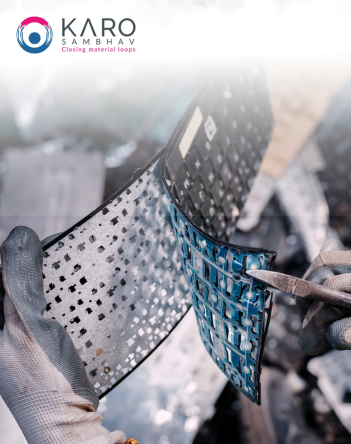Karo Sambhav collaborates with leading organisations to jointly develop industry frameworks, standards, governance mechanisms, systems and processes that advance the transition to circular economy. know more about our alliances.
Lithium battery – a tool that has been instrumental in powering modern-day consumer devices is more than just the goods. Widely known for their high energy capacity, lithium batteries serve as excellent energy storage cells. Regardless of its significant utility, lithium batteries are detrimental to the environment. Not sure how? Well, rechargeable batteries contain high ratios of chemicals and metals. Nickel, copper, lead, manganese, and cobalt are namely a few. The chemicals are highly combustible and toxic in nature. Hence, disposing of the batteries recklessly is harmful and dangerous. Wondering if battery recycling India is a solution to the growing problem of noxious battery waste? Frankly, recycling alone fails to stand out as an effective strategy.
The shift to a robust and strategic circular economy and sustainability steps up as a more pragmatic and change-driven solution. Unfortunately, the awareness of circular economy is not as widespread as recycling. People often care less when trashing the spent batteries. Little do you realise that improper disposal of batteries causes environmental disasters. Looking for an insightful analysis of the problems? Let’s read:
As mentioned above, lithium batteries are brimming with chemicals and metals that are toxic and lethal. The batteries that conk out release chemicals that leach into the environment and tarnish the quality of groundwater in the area. Why just the waterways? The chemicals are a leading cause of air pollution too.
Do you know that chemicals in a lithium-ion battery are highly combustible? Hence, it is no surprise that too much chemical exposure leads to awful fire outbreaks. Haven’t you heard of massive fire incidents in landfills?
From lead and lithium to cobalt, manganese, and more, metals and chemicals that go into the making of lithium batteries are sourced and mined. Excessive mining of raw materials steals the earth of natural resources. Circular economy envisions maximum conservation of natural resources and puts an end to the reckless mining of raw materials.
A well-thought circular economy model addresses the aforesaid problems. Are you still in the blues trying to figure out what circular economy principles are all about and how it is different from recycling? Here’s spilling the beans:
Recycling of batteries implies the collection and refurbishing of batteries for further use. However, circular economy is a more strategic framework that focuses on ensuring that resources do not end up as recyclables in the first place. In short, it is a more sustainable approach that emphasises creating products with a longer lifespan. In circular economy, nothing is reckoned as a waste. Neither a resource nor an end product.
Speaking of batteries, two major issues that crop up in the present times are:
· Batteries with low charging capacities are discarded quick and easy
· The valuable materials used in the making of batteries are gradually becoming extinct from the economy. As per the stats, a stark shortage of lithium will aggravate the challenges of sourcing and implementing renewable energy.
According to strategic circular economy sustainability, rethinking the application of spent batteries is a dire need. For example, lithium batteries, especially the ones used in automobiles, naturally lose 20%-30% of their capacity in a decade. Little did you know that weaker batteries could be reutilised as backups for minor but significant applications in data centres.
If you are not already aware, a circular business model aims to spur the resilient and exponential growth of the economy. Wondering how? Well, a circular economy model puts emphasis on prolonging the use of products and components in a product for as long as possible. The idea revolves around keeping resources in a closed loop. The initiative naturally dwindles the extraction of natural resources, such as lithium, lead, cobalt, and more. What’s more, a hike in the cost of batteries appears far off.
The environmental benefits cannot be underrated. Since circular economy principles prioritise greater use of resources and products, the count of waste declines by leaps and bounds. Less waste is equal to lesser carbon emissions. Hence, environmental impacts such as global warming and planetary crises naturally take a dip. Leading producer responsibility organisations like Karo Sambhav are dedicated to implementing a strategic circular economy model to reduce the surging volumes of battery waste. As an initiative, the organisation educate enterprises and individuals about the importance and objectives of battery recycling, create collection centres, and equips all with state-of-the-art infrastructure to treat the trashed batteries.
Karo Sambhav collaborates with leading organisations to jointly develop industry frameworks, standards, governance mechanisms, systems and processes that advance the transition to circular economy. know more about our alliances.





